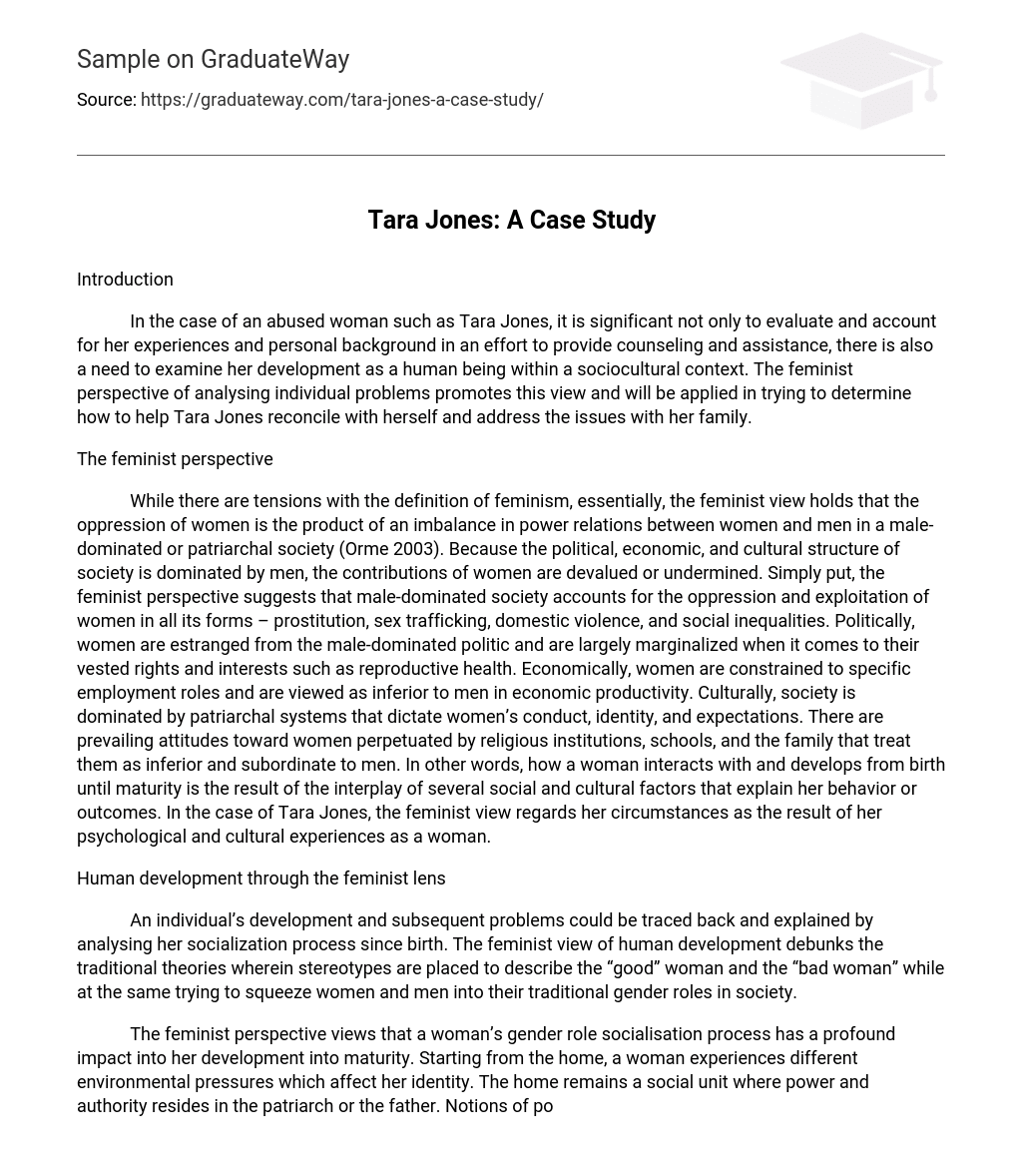Introduction
In the case of an abused woman such as Tara Jones, it is significant not only to evaluate and account for her experiences and personal background in an effort to provide counseling and assistance, there is also a need to examine her development as a human being within a sociocultural context. The feminist perspective of analysing individual problems promotes this view and will be applied in trying to determine how to help Tara Jones reconcile with herself and address the issues with her family.
The feminist perspective
While there are tensions with the definition of feminism, essentially, the feminist view holds that the oppression of women is the product of an imbalance in power relations between women and men in a male-dominated or patriarchal society (Orme 2003). Because the political, economic, and cultural structure of society is dominated by men, the contributions of women are devalued or undermined. Simply put, the feminist perspective suggests that male-dominated society accounts for the oppression and exploitation of women in all its forms – prostitution, sex trafficking, domestic violence, and social inequalities. Politically, women are estranged from the male-dominated politic and are largely marginalized when it comes to their vested rights and interests such as reproductive health. Economically, women are constrained to specific employment roles and are viewed as inferior to men in economic productivity. Culturally, society is dominated by patriarchal systems that dictate women’s conduct, identity, and expectations. There are prevailing attitudes toward women perpetuated by religious institutions, schools, and the family that treat them as inferior and subordinate to men. In other words, how a woman interacts with and develops from birth until maturity is the result of the interplay of several social and cultural factors that explain her behavior or outcomes. In the case of Tara Jones, the feminist view regards her circumstances as the result of her psychological and cultural experiences as a woman.
Human development through the feminist lens
An individual’s development and subsequent problems could be traced back and explained by analysing her socialization process since birth. The feminist view of human development debunks the traditional theories wherein stereotypes are placed to describe the “good” woman and the “bad woman” while at the same trying to squeeze women and men into their traditional gender roles in society.
The feminist perspective views that a woman’s gender role socialisation process has a profound impact into her development into maturity. Starting from the home, a woman experiences different environmental pressures which affect her identity. The home remains a social unit where power and authority resides in the patriarch or the father. Notions of power and authority at the family level eventually become validated as the woman experiences socialization in the educational institution where behaviors and patterns of thinking are dictated by men. In the school, the woman is prepped to occupy her prospective place in the workforce – as members of the service industry, in education, in health – characterised by poor wages, poor benefits, and poor chances of career advancement. Soon, the woman is socialised into her future motherhood role through marriage, a cultural process where power and authority resides with the husband.
Understanding social and cultural experiences of women would help understand their psychological problems better. In the case of Tara Jones, there is clearly a cultural bias against her on the part of her husband’s family who had prejudged her as being unworthy and unfit to be a wife and mother. This could be explained by her poverty and her family background (a broken home and a homosexual sister). Indeed, John’s (the husband) family has resorted to “victim-blaming” to justify their son’s abusive behavior towards Tara. Judging from Tara’s use of depressants, it is clear that she is suffering from depression, which feminists consider as a common illness among women whose circumstances are almost always defined by poverty and domestic violence. However, there is also an indication that Tara wants to build a life independently with her children by refusing to give her husband custody over her children.
The feminist view would not hold Tara accountable for her predicament but would suggest that Tara has experienced a great powerlessness, fear, lack of identity, and lack of self-esteem (Fowles 2008). Although there is the desire to break free from abuse, like many other women, Tara’s natural motherhood instinct to keep her family together no matter what the cost can even be viewed as pathological.
Intervention
Feminist psychology treats the traditional psychological theories as inadequate when explaining the problems encountered by women such as domestic violence. First of all, the feminist approach views that “the personal is political” meaning that problems encountered by the individual are the result of several factors, primarily the socialisation process (Fook 2002). The negative impacts of male-dominated gender role-socialisation could be mitigated, for instance, by enhancing women’s skills and education. In terms of counseling, the feminist approach is egalitarian so that the therapist does not overcome the client in sessions (Fowles 2008). The thrust of therapy must be to restore a sense of power and confidence by reorienting her beliefs and helping her understand that her problems could be solved and she has the power to solve them.
Conclusion
The feminist perspective has gained momentum in the field of social work and psychology because it provides a gendered analysis on the outcome and problems confronting women specifically those who are abused, oppressed, and exploited. However, attributing responsibility away from the client by focusing on merely the external factors provides a limitation on this perspective. Counseling needs to also make the client resolve that she is partly responsible for her problems so she can move on and correct her shortcomings.
List of References
Fook, J 2002, ‘Theorising from Practice: Towards an Inclusive Approach for Social Work Research’,Qualitative Social Workvol. 1, no. 1, pp. 79-95.
Fowles, TB 2008,‘The contributions of feminist therapy’, Psychnet-UK, viewed 19, 2010, <http://www.psychnet-uk.com/readers_articles/contributions%20of%20feminist%20theory.htm>.
Orme, J 2003, ‘It’s feminist because I say so!’Qualitative Social Work, vol. 2, no. 2, pp. 131-153.





